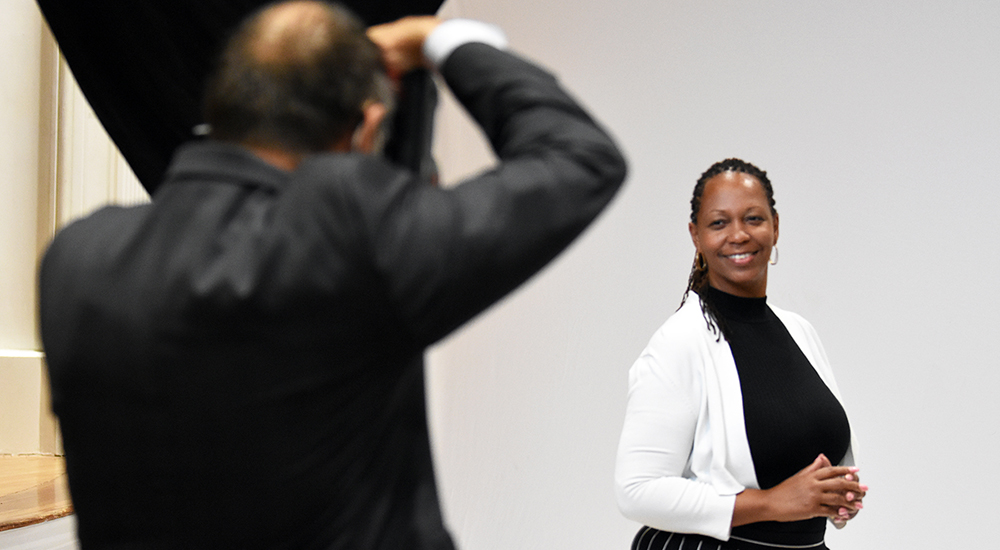More than 90 Gulf Coast Veterans Health Care System (GCVHCS) women Veterans, who are also VA employees, participated in a recent virtual photo exhibit recognizing their military service contributions.
The ‘I Am Not Invisible’ exhibit was on display at the Biloxi VA Medical Center in Biloxi, Mississippi, and the Joint Ambulatory Care Center (JACC) in Pensacola, Florida.
VA’s Center for Women Veterans spearheaded this national campaign to increase awareness and dialogue about these Veterans. It also opens viewers’ eyes to the contributions, needs and experiences of ladies who have served during all eras of the U.S. Armed Forces.

The ‘I Am Not Invisible’ exhibit was on display at the Biloxi VA Medical Center in Biloxi, Mississippi and the Joint Ambulatory Care Center in Pensacola, Florida.
Gene Russell was the photographer for the VA Secretary and official ‘I Am Not Invisible’ campaign photographer. He has traveled to more than 40 states to complete the three-year project.
The day-long photo shoots provided the opportunity to participate in an initiative that GCVHCS Women Veterans Program Manager Donna Maxwell said is important to the changing perception of women who have military service.
These Veterans “are not invisible”
“Women Veterans have served since the Revolutionary War,” said Maxwell. “Most people don’t realize there are two million women Veterans today. That number increases daily. Projects such as this highlight the fact that women are not only daughters, mothers, sisters, wives, and girlfriends. They are Veterans who have made important contributions to this country and we are not invisible.”
Participation in the photo shoot was staggered to observe physical distancing guidelines. Some ladies brought mementos, including uniform items, photographs, and other military memorabilia for inclusion in their photographs.
Event participant Yolonda Robert, an Oncology-licensed practical nurse at the JACC, said the project serves two purposes.
“I think it’s very important for women to be acknowledged for their service,” said Robert. “Projects such as this help highlight the role women Veterans have played throughout our history. And it also brings to light the fact that VA has health care services for women.”
Each photograph included in the project features a brief biography of the Veteran and their thoughts on their service. It also brings attention to the importance of both the project and the changing perception of female Veterans.
We need to teach America how these Veterans served their country
“We’ve photographed 2,600 Women Veterans who have served America,” said Russell. “One of the most amazing things about this project is we take their information and put it on the poster. We share that through the Center for Women Veterans Facebook page. We need to teach America how these women served their country and the various ways they served their country.”
Russell added that completed photographs of GCVHCS Women Veterans – as well as other ‘I Am Not Invisible’ campaign participants – are available on the Center for Women Veterans website. A video of the GCVHCS photo shoot is also available on the GCVHCS Facebook page.
The U.S. Congress established the Center for Women Veterans in 1994. The center monitors and coordinates the VA’s administration of health care and benefits services and programs for female Veterans. The center also serves as an advocate for a cultural transformation (both within VA and in the general public) in recognizing the service and contributions of women Veterans and those still in the military. It also raises awareness of the responsibility to treat all Veterans with dignity and respect.
The Biloxi VA Medical Center and the Mobile, Pensacola, Eglin and Panama City VA clinics are part of the GCVHCS. The GCVHCS headquarters is in Biloxi. We provide a variety of medical outpatient services to more than 70,000 Veterans.
Bruce Cummins is a public affairs specialist and Wayne Alley is chief of Medical Media Service. Both work for the Gulf Coast Veterans Health Care System.
Topics in this story
More Stories
The Medical Foster Home program offers Veterans an alternative to nursing homes.
Watch the Under Secretary for Health and a panel of experts discuss VA Health Connect tele-emergency care.
The 2024 National Veteran Suicide Prevention Annual Report provides the foundation for VA’s suicide prevention programs and initiatives.






